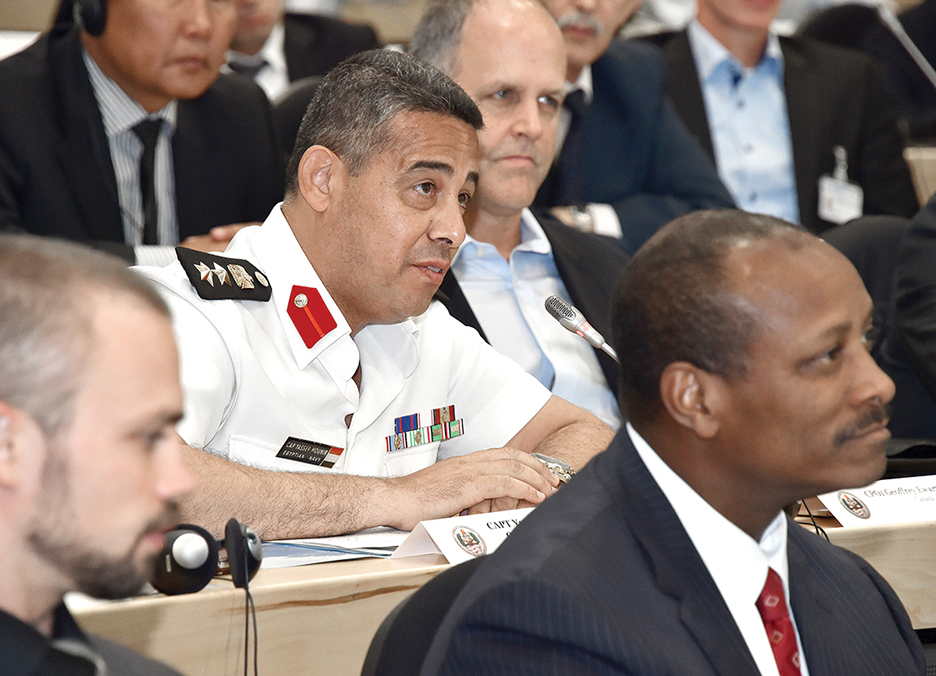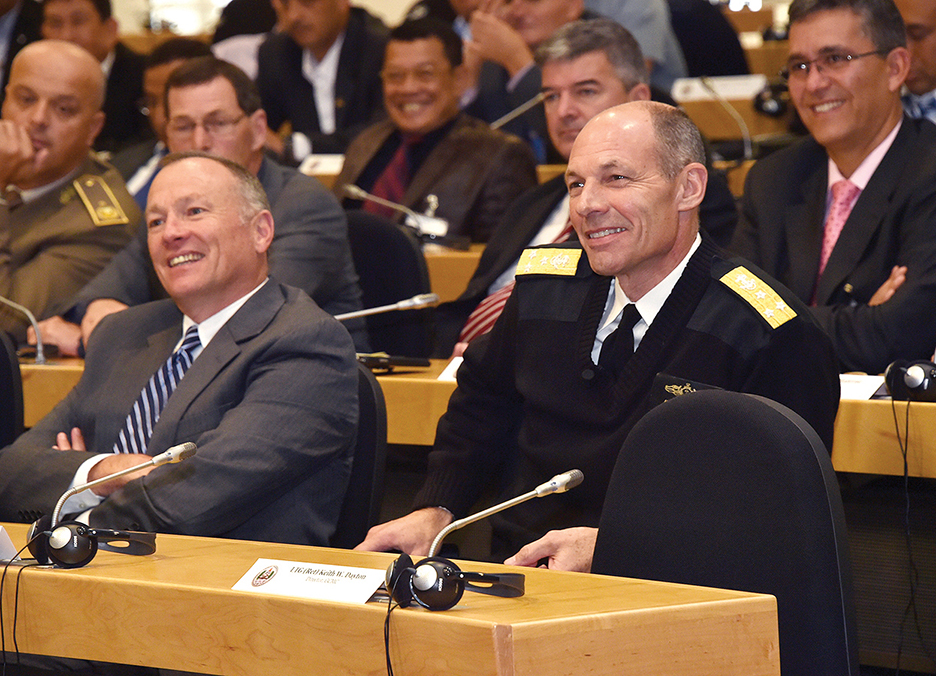Eurasian security leaders discuss solutions to 21st century threats
By Marshall Center Public Affairs
National ministers and senior government and military officials from 40 nations met at the George C. Marshall European Center for Security Studies for a five-day seminar titled “21st Century Converging Threats: Nexus of Terrorism, Drugs and Illicit Trafficking.” The Senior Executive Seminar examined and discussed transnational crime and terrorism, and strengthening professional relationships among participants to counter these threats. The event included not only lectures from international experts specializing in countering terrorism and organized crime, but also smaller group discussions designed to build trust and understanding among participants to find common ground for cooperative responses.
Keynote speakers and panel discussions with subject matter experts helped participants evaluate the myths and reality of convergence between global terrorism and organized crime and then explore emerging trends in criminal/terrorist tactics and technology.
It should come as no surprise that the Islamic State (IS) was discussed extensively, as it was in previous senior executive seminars. Gen. Hussein Hazza’ Majali, former interior minister and minister of municipal and rural affairs of Jordan, offered his perspective. Calling IS a terrorist organization, Majali said it was different from other extremist groups because it’s the first to hold territory. He told participants that IS leverages an impressive business model to finance and gain territory across ungoverned spaces. He also warned that the organization continues to evolve. The IS recruiting focus has shifted from disenfranchised youth to educated professionals and other cooperative states and nonstate actors attracted to IS resources such as oil.
Lessons learned from countering the insurgency in Afghanistan were also explored in great detail with perspectives offered by Afghan Minister of Interior Affairs Noorolhaq Olomi; Italian Brig. Gen. Carmelo Burgio, who commanded the Combined Training Advisory Group-Police responsible for training the Afghan National Police; and John Sopko, special inspector general for Afghanistan reconstruction.

The lessons they shared were to maintain international and interagency cooperation and information sharing; cooperate with the private sector and nongovernmental organizations; keep pace with the adaptive nature of nonstate actors; find the balance between security and civil liberties; and have adequate resources to implement security strategies.
During the weeklong seminar, the 74 attendees participated in smaller working groups for four workshop sessions, allowing them to discuss the convergence and nexus of terrorism, drugs and trafficking. These groups reached a consensus that the issue of convergence may be overstated.
Many felt that terrorism and crime converged and diverged at various times. When it occurred, it was more a “marriage of convenience” rather than a deliberate strategic alliance. In fact, participants downplayed the importance of defining “nexus,” “convergence” and “hybrid.” Most were more interested in focusing on effective responses and whole of society responses to issues such as corruption and radicalization.
The issue of the large migrant exodus to Europe raised concerns in workshop sessions and in coffee break discussions. Many thought the international community was dealing with the symptoms of the problem and not the real reasons why people were leaving. Keynote speakers and participants recognized a deeper problem than the migrant exodus — the economic vacuum left behind in Iraq and Syria and the failure of their reconstruction efforts.

Among other keynote speakers who addressed participants were NATO Supreme Allied Commander Gen. Philip Breedlove, who also commands the U.S. European Command; Chairman of the European Union Military Committee Gen. Patrick de Rousiers of France; and U.S. Africa Command Deputy for Military Operations Vice Adm. Michael Franken.
The importance of the Marshall Center’s international participants in shaping understanding can’t be emphasized enough. The problems examined during the Senior Executive Seminar can be exacerbated or difficult to solve when viewed from a “Western-only” perspective. The need to understand local cultures, history and circumstances is important. Bringing together this international executive group was vital to examining the issues objectively and without stereotypes.
Accordingly, many participants equated good governance in Africa and the Middle East with strong, even repressive, governance. In their opinion, liberal, democratic norms touted by the West were less helpful in solving major problems. To most of the workshop members who contributed to the debate, security and stability seemed to matter more than personal freedoms.
The Senior Executive Seminar in 2016 is scheduled for September 12-16. It will be offered only in English. Governmental and military leaders interested in attending should contact the U.S. or German embassies in their respective nations or email the Marshall Center registrar at registrar@marshallcenter.org


Comments are closed.